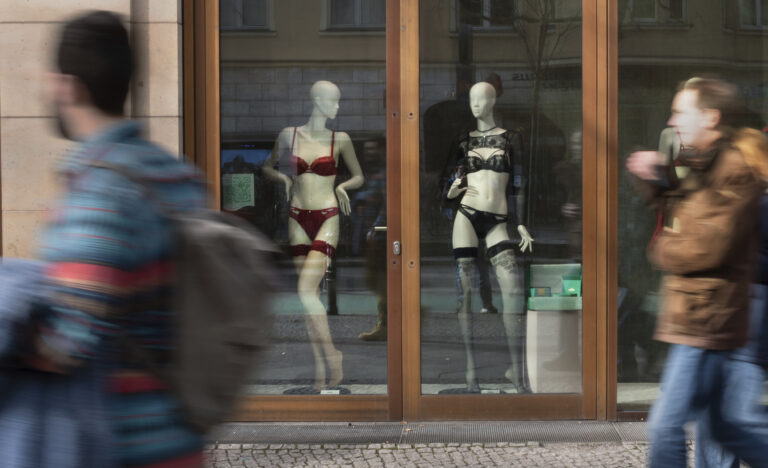President Donald Trump’s new tariffs on Vietnam and China are set to ripple through the U.S. retail sector and sharply increase the cost of consumer goods—including women’s underwear.
Trump is imposing a new 46 percent tariff on imports from Vietnam and a 34 percent tariff on those from China, hitting two of the world’s largest suppliers of clothing and footwear to the U.S. economy.
The new tariffs, which take effect April 9, target key production hubs for American brands that have relied on manufacturing in Asia in recent years.
Vietnam exported $1.24 billion worth of women’s undergarments in 2023, making it the second-largest supplier in the category globally, according to Observatory of Economic Complexity (OEC) data. With the U.S. being the largest importer—bringing in $2.21 billion of undergarments last year—analysts warn that prices on intimate apparel could rise sharply if companies pass increased production costs to consumers.
“Vietnam has proven its ability to play the geopolitical game very skillfully,” said Johannes Loefstrand, a portfolio manager at T. Rowe Price, in an interview with Reuters.
How Much US Women’s Underwear is Produced in Asian Markets?
According to the Observatory of Economic Complexity, Vietnam trails only China in global exports of women’s undergarments, a category that includes bras, corsets, girdles and shapewear. In 2023, China exported $4.43 billion of these goods, while Vietnam contributed $1.24 billion. Combined, China and Vietnam supplied more than half of all such exports worldwide.

picture-alliance/dpa/AP Images/Wolfram Steinberg
The United States will impose a 34 percent reciprocal tariff on Chinese imports, in addition to the existing 20 percent tariff already in place, bringing the effective rate to 54 percent.
The U.S. market depends heavily on these imports. Statista reported that the U.S. women’s nightwear and underwear market generated $22.7 billion in revenue in 2022, far surpassing other countries. With little domestic infrastructure to replace these imports, U.S. brands have limited flexibility to avoid tariff impacts.
Nasim Fussell, senior vice president at the lobbying firm Lot Sixteen, said at a recent industry event, “We’re all kind of nervous about Vietnam,” according to Fashion Dive. Fussell noted that Trump’s trade strategy had shown that “it doesn’t really feel safe wherever you go right now.”
Which Clothing Manufacturers Could Be Impacted by Trump’s Tariffs?
The shapewear industry, led by billion-dollar brand Skims, is among the most exposed. Founded by Kim Kardashian, Skims has come under scrutiny for its use of synthetic fabrics and opaque production practices. According to EarthDay.org, the brand’s products are manufactured in Thailand and China.
The report noted that while Skims’ website claims workers are “ensured fair wages, safe environments and healthy working conditions,” many garment factories in those regions are in countries “where underpaid workers feel the most direct effects of fashion pollution.”
Other apparel giants are similarly exposed. Nike produced 28 percent of its apparel and 50 percent of its footwear in Vietnam in 2024. “If tariffs are extended there, then Nike’s got a problem,” said Morningstar analyst David Swartz, according to Reuters.
Adidas, Lululemon, Columbia Sportswear, and VF Corporation—all major players in athletic and lifestyle wear—also rely heavily on Vietnamese suppliers. American Eagle’s CFO, Michael Mathias, said during a recent earnings call that 20 percent of its production comes from Vietnam, a level the company hopes to reduce, Reuters reported.
Yet, American Eagle CEO Jay Schottenstein expressed caution about moving too quickly. “I wouldn’t be rushing. You go rush, where am I rushing to? I don’t know where I’m rushing to,” he said in a statement to CNBC.
The Global Undergarment Supply Chain Is Tightening
With China and Vietnam together accounting for nearly $6 billion in women’s undergarment exports in 2023, alternative sources remain limited. According to OEC data, the next largest exporters—Sri Lanka, Bangladesh and Indonesia—do not have the capacity to absorb a large-scale production shift.
Peter Baum, CFO of New York-based apparel firm Baum Essex, told CNBC that his company cannot survive such sweeping trade changes. “This is how you start a global depression. After 80 years and five generations, Trump just put us out of business.”


